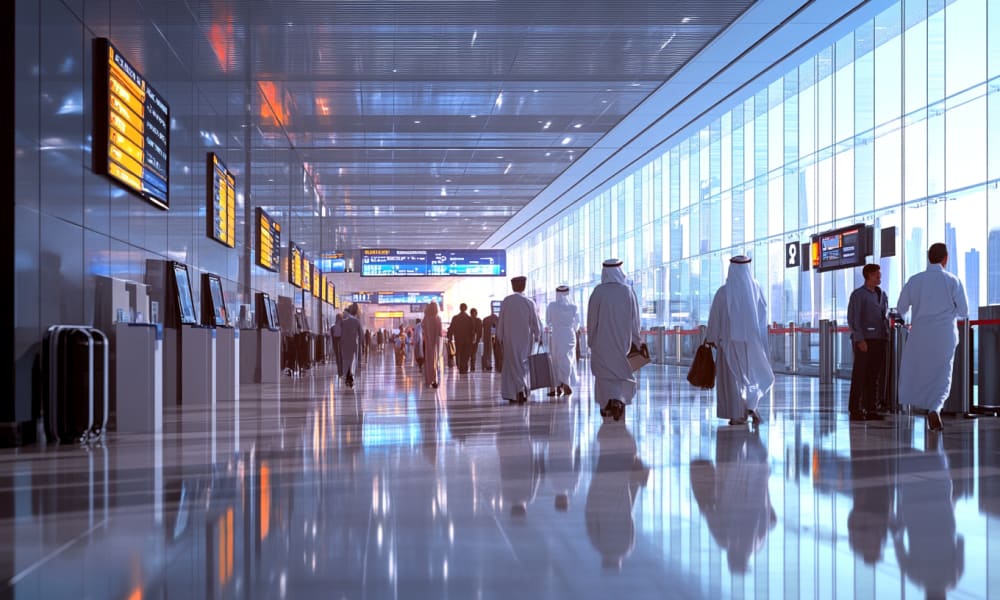
Entry requirements for the United Arab Emirates
What you should know before your trip
What you should know before your trip
The United Arab Emirates are no longer just a stopover on the way to the Far East – they have become a destination in their own right. Individual travelers in particular are discovering the UAE as a fascinating mix of oriental culture, modern architecture, and luxurious comfort. Whether dining under the stars with a view of the Burj Khalifa, retreating to a desert resort with a private villa, or taking a yacht trip along the skyline of Dubai: Those who travel individually to the Emirates seek something special – and they find it.
To ensure that your stay runs smoothly from the beginning, this article provides a comprehensive overview of all important entry requirements – from visa regulations to travel documents to customs regulations. This way, you are well prepared to make the most out of your individual trip to the United Arab Emirates.
Current entry requirements for different nationalities
Entry into the United Arab Emirates is uncomplicated for many nationalities – however, there are country-specific differences that you should consider when planning your trip. The most important regulations concern visa issues, travel documents, and duration of stay. Since regulations can change at short notice, checking official sources is essential – especially for long-term stays or multiple entries.
Visa regulations for European nationals
Citizens of most European countries – including Germany, Austria, and Switzerland – do not require a visa for tourist stays of up to 90 days within a period of 180 days in the United Arab Emirates. Upon entry, a free residence permit is granted, which is automatically stamped at passport control.
It is important that the passport is valid for at least six months upon entry. An extension of the visa-free stay is generally not possible. Those planning to stay longer or enter multiple times should inform themselves early about suitable visa options – such as a long-term visa or a multi-entry visa. The Foreign Office provides current and binding information on its website.
Visa requirements for travelers outside of Europe
For nationals outside of Europe, such as from India, South Africa, or South America, there are partially differing regulations. Many of these travelers require a visa prior to entry, which must be applied for online or through the respective embassy. Alternatively, some nationalities may be eligible for a visa on arrival or an electronic visa (eVisa).
For U.S. travelers, there are simplified conditions: They typically receive a free visa upon arrival in the UAE for up to 30 days, which can be extended once for an additional 30 days. A passport that is still valid for at least six months is also required here. The U.S. government provides current information through the Department of State.
Regardless of nationality: Be sure to check for the latest entry requirements with the official embassies and government portals of your home country well in advance. This is particularly important for changed health regulations, security measures, or visa requirements that can come into effect at short notice.
Travel documents and requirements
Anyone wishing to travel to the United Arab Emirates should inform themselves in detail about the valid entry requirements in advance – especially regarding travel documents. Even small deviations from the official requirements can lead to entry refusal. The UAE places great emphasis on clear identity characteristics and adherence to international security standards – particularly for individual travelers who want to plan their trips flexibly and independently.
Validity requirements for passports
A biometric passport is required for entry into the United Arab Emirates. The document must still be valid for at least six months at the time of entry – even for stays of just a few days. This rule applies regardless of nationality, though specific restrictions must be considered for German nationals:
Temporary passports, identity cards, and provisional identity cards are not permitted. Similarly, extended children’s passports are not accepted. Children require their own valid children’s passport – but only if it was issued before January 1, 2024. New children's passports have not been issued since then.
The passport must contain full first and last names, as well as a clearly stated gender ('M' or 'F'). Vague or incomplete information – such as a birth date with placeholders like 'XX.XX.' – can lead to refusal at the border. Additionally, a biometric iris scan is performed upon entry and exit, which is why only electronic passports marked as 'ePass' with a chip are accepted.
Visa application and process
For many travelers – including German nationals – entry into the UAE is straightforward: The tourist visa is issued upon arrival and allows a stay of up to 90 days within a six-month period. In these cases, a prior visa application is not necessary.
However, for those who wish to apply for a special visa – such as for longer stays, business purposes, or new visa forms like the 'Talent Visa' – it is advisable to gather information about the required documentation in advance. Depending on the visa category, this may include a recognized university degree, proof of financial means, or valid international health insurance. The application is generally submitted digitally through the official platforms of the UAE and should be made with sufficient lead time.
Entry requirements for children and minors
The United Arab Emirates warmly welcomes families with children – as long as the travel documents and entry papers are in order. Particularly for individual travelers traveling with children or whose offspring are traveling alone, special regulations apply. To avoid inconvenience at the border, it is advisable to familiarize yourself early with the current regulations. The following notes provide an overview of the key requirements for the entry of children and adolescents into the UAE.
Requirements for children's passports
As of January 2024, all children with German nationality require their own travel document – the previously common children's passport has been abolished. For travel to the United Arab Emirates, a valid biometric passport is required. Child entries in the parents' passport are no longer accepted and will lead to refusal at the border.
For children under 12 years old, a biometric passport with a validity of up to six years can be applied for. All guardians must appear in person with the child at the passport authority for issuance. An up-to-date biometric passport photo, if necessary, a birth certificate, and proof of guardianship are required. It is also important that the passport is valid for at least six months beyond the planned departure date – a key requirement for entry into the UAE.
Entry of unaccompanied minors
The entry of unaccompanied minors under 18 years of age into the United Arab Emirates is generally not permitted. However, if there are plans for a child to travel alone or only with one parent or another third party, stricter proof obligations must be expected. In such cases, an informal consent form from the guardians is urgently required – in English and ideally supplemented by:
- a copy of the child's birth certificate,
- copies of the identification documents of the guardians,
- if applicable, proof of exclusive custody of the accompanying person.
Additionally, some airlines require their own approval forms or additional documents for unaccompanied minors. These should be clarified with the airline in advance. Full and accurate information in the passport is also crucial – incomplete passport details (e.g., missing first name or birth date) can lead to refusal of entry.
Particular attention is given to the protection against child abductions. In sensitive cases, an exit ban may be in place, which can only be lifted by a court order or with the consent of the other guardian. Therefore, it is recommended that in cases of uncertainty or special circumstances, you contact the embassy or a consulate of the UAE in advance.
Customs regulations and goods traffic
The United Arab Emirates are considered a luxurious travel destination – but clear customs regulations apply here as well, which travelers should be aware of. Those bringing personal items, technology, or luxury goods into the Emirates should familiarize themselves in advance with the applicable duty-free allowances and import limits. Because even small exceedances or unclear declarations can lead to delays or charges upon entry. Especially individual travelers who value high-quality equipment and enjoyment should familiarize themselves with the most important regulations.
Import limits for personal goods
Personal items such as clothing, cosmetics, smartphones, or cameras can generally be imported duty-free – provided they are clearly intended for personal use. However, if you carry large quantities of identical products, such as ten new smartphones or several identical watches, you must expect a customs declaration and possible fees.
Special provisions for luxury items
Luxury goods such as high-quality watches, jewelry, designer handbags, or electronics are subject to the same value-free limits as other goods – there are no special regulations. This means that even a single piece of jewelry can be subject to duty if the free limit is exceeded.
Especially when traveling to the UAE, where luxurious souvenirs like perfume, fashion, or technology items are popular, careful consideration is worthwhile: If the goods are intended for personal use, within the permitted free limits, and correctly declared, there are generally no problems. However, those traveling with expensive new purchases without declaration risk not only back payments but also delays or even fines.
Import of medication
If you regularly take medication, it is advisable to gather comprehensive information about the import regulations before traveling to the United Arab Emirates. The UAE has very clear regulations regarding medications – particularly for prescription drugs, strong medications, or preparations not approved in Europe. To avoid unpleasant surprises upon entry, we have compiled the most important provisions and guidelines for you.
Approved medications and regulations
In principle, you are allowed to bring medications for personal use into the UAE – this also applies to preparations that are not officially approved in the Emirates. The key is that the amount imported corresponds to the usual consumption for a maximum of 90 days and that the medications are intended solely for personal use. Bringing them for other persons or in excess of personal need is not allowed.
For many common medications, it is sufficient to carry a doctor's prescription or the package insert showing the name, active ingredient, and dosage. Make sure that medications are transported in their original packaging and, whenever possible, are accompanied by a letter from your doctor in English.
Particular caution is required for medications that fall under the category of narcotics, strong pain relievers, or certain hormonal substances. These can only be imported with prior approval from the Emirati health authority (MOHAP). Preparations containing protected ingredients, such as certain herbal extracts, may also be subject to restrictions. An up-to-date list of approved substances is provided by the relevant health authority on its website.
Application for special permits
If you need medications that are not approved in the United Arab Emirates or whose active ingredients are classified as sensitive, prior approval from the Ministry of Health and Prevention (MOHAP) is mandatory. Private individuals cannot submit this application themselves – it must be done through your treating physician.
In exceptional cases, so-called hardship regulations may apply for strong-acting, prescription medications, or those not approved in Germany. A detailed medical justification is required, explaining why the medication is necessary and cannot be replaced by any other product available in the UAE.
The application process includes several steps: Your doctor prepares a medical justification and submits it to the relevant authority or the manufacturer. At the same time, a query about cost coverage can be made with the health insurance company. Only after receiving official approval may the medication be carried or, in exceptional cases, obtained on site.
Please note: The shipping of medications from abroad – such as by mail or courier service – is strictly prohibited in the UAE. All necessary medications should be carried personally and, ideally, registered before the trip. In case of uncertainty, it is advisable to consult a specialized doctor or the UAE embassy.
Emergency contacts in the UAE
Even on a perfectly planned individual trip, unexpected situations can arise. Therefore, it is especially important to get help quickly and reliably in an emergency. In the United Arab Emirates, emergency services are well organized, and numerous points of contact for tourists are available – both officially and consularly. Below you will find the most important numbers and contacts for medical, security-related, or consular emergencies.
Important contact numbers
The UAE has a nationwide uniform emergency call system. In acute emergencies, you can reach the responsible authorities 24/7 at the following numbers:
- Police: 999
- Ambulance / Emergency services: 998
- Fire brigade: 997
- Coast guard (search and rescue): 996
- Power failure: 991
- Water emergencies (Abu Dhabi): 992
- Emergency call center Abu Dhabi/Al Ain/Al Dhafra: 993
For tourist-specific inquiries, there are additional hotlines:
- Tourist police Dubai: 901
- Tourist police Abu Dhabi: +971 2 800 2626 or +971 2 512 7777
- Dubai Tourism Helpline: +971 4 609 6239
- Consumer protection Abu Dhabi: 800 555
- Consumer protection Dubai: 600 545 555
Medical facilities such as Dubai Health Authority (800 342) or renowned hospitals like Sheikh Khalifa Medical City and Mediclinic Al Noor Hospital are also available in emergencies.
Tip: It’s best to save these numbers in your mobile phone before your trip and ensure you can provide precise details about your location and situation in an emergency. For people with disabilities, an emergency notification via SMS to 5999 is also possible in Abu Dhabi.
Embassies and contacts
In consular emergencies – such as loss of passport, illness, accident, or arrest – the German representation in the UAE is your most important point of contact:
German Consulate General Dubai
- Phone (during office hours): +971 4 302 4333
- Emergency service (outside office hours): +971 (0)50 650 4134
- E-mail: info@dubai.diplo.de
The consulate general is responsible for all consular matters – even for German nationals in Abu Dhabi or other Emirates. It provides assistance with the issuance of replacement documents, contacts relatives in Germany, and arranges medical or legal support if necessary.
German Embassy Abu Dhabi
- Phone switchboard: +971 2 596 7700
- Note: No consular care – emergencies are handled through the consulate general in Dubai.
Austrian citizens can reach the Austrian Embassy in Abu Dhabi at +971 2 694 4999.
Our tip: Before traveling, check the websites of your respective foreign representations and download available emergency brochures there. This way, you are also well prepared for exceptional situations and know whom to contact.
Discover the Orient with experts who have explored every corner themselves
Your dream holiday, tailor-made by experts.
We don't just know the Middle East from books, we visit the country several times a year to experience the culture, landscape and people first-hand.
From your first enquiry to your return home, we are there for you personally - by phone, email or WhatsApp, whenever you need us. Our trips are as unique as you are: individually planned and provided with exclusive privileges and high-quality arrangements that will make your trip unforgettable.
Experts for your Orient trip







